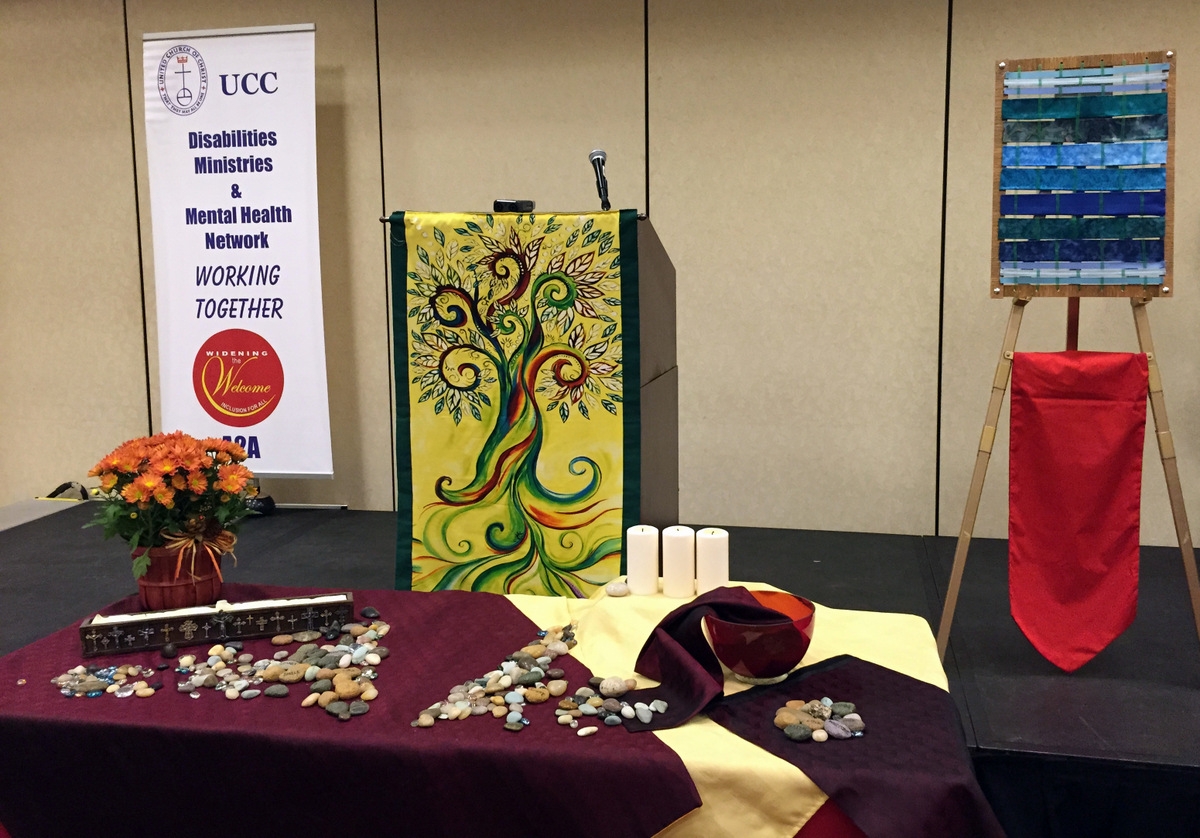Mental Health and Congregational Care: NBA Responds to the Call for Welcome and Support
 “What if we became the church where weekly group-processing sessions mimicked the ‘great cloud of witness’ Hebrews talks about? Or the church where depression-fighting gratitude journals were just as significant as lectionaries? What if when we cried out ‘give us this day our daily bread,’ we were met with mindfulness activities to ease our anxiety and freely worship in a space where feelings charts and fidget toys openly illuminated the gentle guidance of the spirit?” ~Ms. Angela Whitenhill
“What if we became the church where weekly group-processing sessions mimicked the ‘great cloud of witness’ Hebrews talks about? Or the church where depression-fighting gratitude journals were just as significant as lectionaries? What if when we cried out ‘give us this day our daily bread,’ we were met with mindfulness activities to ease our anxiety and freely worship in a space where feelings charts and fidget toys openly illuminated the gentle guidance of the spirit?” ~Ms. Angela Whitenhill
As the health and social service general ministry of the Christian Church (Disciples of Christ), the National Benevolent Association (NBA) takes seriously its call to create communities of compassion and care. In doing so, the NBA has been called to engage in dialogue and action centered on the issue of Mental Health and Congregational Care.
Real concerns of mental health are prevalent in our country, and indeed in our communities of faith. Fear, uncertainty, danger, shame, guilt, hopelessness, and helplessness have taken up residence in our homes and churches as sufferers of mental health issues, their families and friends, people of faith, both clergy and lay, law enforcement, and many others grapple with how to respond to increasingly difficult situations. Churches—often seen as places where people find welcome and hospitality—are far too often places of discomfort and pain for many who feel they cannot share their stories of living with mental illness and/or mental health disorders. Pastors and other church leaders often feel helpless and ill-prepared to offer care and support to individuals and families struggling with such issues.
In an effort to open up this dialogue, and in response to the passing of GA-1523 “Becoming A People of Welcome and Support to People with Mental Illness and/or Mental Health Issues” by the 2015 General Assembly of the Christian Church (Disciples of Christ), the NBA has called together a research and design team tasked with structuring a Mental Health and Congregational Care Affinity Group. This group will serve as a network of support for Disciples congregations and communities engaged in spiritual care and advocacy ministries with those affected by mental illness and/or mental health disorders. The research and design team is made up of a diverse group of individuals from across the life of the Church, both clergy and lay:
- Mary Alice Do – retired Disciples clergy, collaborator, and co-author of the GA-1523 resolution; resides in Tucson, Arizona
- Chris Furr – ordained Disciples clergy, senior minister at Covenant Christian Church (Disciples of Christ) in Cary, North Carolina
- Hector Hernandez – ordained Disciples clergy, pastor of Iglesia Nueva Creación, a Presbyterian Hispanic church in Indianapolis, Indiana
- Sarah Griffith Lund – ordained Disciples clergy, vice president of advancement at Christian Theological Seminary in Indianapolis, and author of Blessed are the Crazy: Breaking the Silence about Mental Illness, Family and Church
- Suzanne Quenette – Disciples lay leader, licensed professional counselor, and NBA board member; resides in Austin, Texas
- Angela Whitenhill – licensed clinical social worker, licensed minister, former chaplain and therapist at Tennyson Center for Children in Denver, Colorado (a Disciples Care Exchange participant), and the research and design team group convener
- Perry Wiggins III – ordained Disciples clergy, senior pastor of Alameda Christian Church in Nashville, Tennessee
In her reflections on why she has committed to serving as group convener for the Mental Health and Congregational Care research and design team, Whitenhill states:
“So often we celebrate the many layers of diversity within our denomination, while centering our witness in encouraging the multitude to gather at the table in one spirit. And now, with the leadership of the mental health affinity group, I am excited that we can deepen this articulation of diversity to incorporate the more complex aspects of our humanity, and expand our celebration to lift up the fullness of our testimonies without shame or stigma.
Because what I took away the most while serving as chaplain at the Tennyson Center for Children Colorado Christian Home is that Jesus meets us in our most vulnerable places…in the intricacies of our stories others dare not uncover. I’m overjoyed by the possibilities of ‘Jesus sightings’ that will come as our mental health affinity group unearths a part of our spiritual DNA so in need of attention.”
This research and design team will work through December 31, 2015, to define the purpose and goals of a full Mental Health and Congregational Care Affinity Group to launch in early 2016. This is a shared effort with Disciples Home Missions (DHM).
For more information on the NBA Mental Health and Congregational Care Affinity Group, please email mkilpatrick@nbacares.org.
Printer-friendly version here!
Photos: Members of the Mental Health and Congregational Care Affinity Group research and design team attended the UCC’s Widening the Welcome conference in September 2015, exploring what it means to Welcome, Include, Support and Empower those experiencing disabilities and mental health challenges in our churches and communities.



